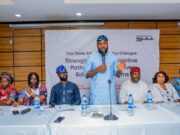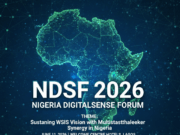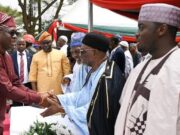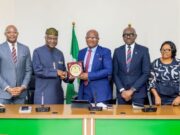The Nigeria Customs Service (NCS) has revealed it is expecting the delivery of about 67 new scanners from China to strengthen operations at seaports and border posts nationwide in a bid to overhaul its cargo inspection process and reduce physical examinations at ports by half before the end of the third quarter of 2025.
Comptroller General of Customs, Adewale Adeniyi, who made this known at a recent industry engagement in Lagos, where he presented a paper titled: “NCS and Its Trade Modernisation Programs: Benefits and Challenges”, emphasised that the scanners, funded by concessionaires as stipulated in the Nigeria Customs Service Act (NCSA) 2023, are central to the Service’s drive to cut down manual inspections by at least 50 percent.
The CGC was represented by the B’Odogwu Project Manager, Assistant Comptroller Oyindamola Abass Oladepo
He said: “The CG actually travelled to China with the concessionaires some months ago to ensure the scanners meet operational standards.
“So far, we have over 67 scanners expected, aside from the few we already have. But let’s be clear: the law assigns that responsibility to terminal operators. It’s not about Customs dodging duties; it’s the law as passed by the National Assembly.”
He added that stakeholders, including terminal operators and industry leaders, were involved in the discussions that led to the law’s enactment.
“This decision wasn’t made in isolation. It was a joint effort to enhance trade facilitation at our ports and borders,” he said.
Beyond equipment upgrades, Customs is also revamping its technology with a new processing platform, B’Odogwu, which Adeniyi described as a major departure from the existing Nigeria Integrated Customs Information System (NICIS).
He underlined that the new platform also addresses long-standing concerns about document fraud and third-party interference.
“B’Odogwu is web-based and has a far more intuitive interface than NICIS. It’s seamless to navigate, and traders can initiate the registration of Form M from anywhere—no need to go to a bank,” he explained.
“With B’Odogwu, only the trader can select who handles their Pre-Arrival Assessment Report (PAAR). The days of unauthorised persons hijacking company documents are over.”
He also highlighted the system’s stricter compliance measures, noting that only insurance providers registered with the National Insurance Commission (NAICOM) can process entries.
The CGC pointed out a critical shift in data control, stating that unlike NICIS, which was hosted externally, B’Odogwu is operated and maintained entirely by the Nigeria Customs Service’s internal ICT team.
“On B’Odogwu, you cannot upload invalid documents and expect it to go through. The platform enforces compliance and legitimacy.”
“With NICIS, our data wasn’t fully under our control. Now, with B’Odogwu, we manage everything in-house. Data is protected, and fears around cyberattacks are being addressed through local oversight,” he assured.
The platform, Adeniyi revealed, is being piloted by Trade Modernisation Project Limited, a fully indigenous company that has partnered with Customs since September 2022. In addition, he noted the Service has rolled out stakeholder engagements, media sensitisation, and town hall meetings across its commands to ensure smooth adoption.
“Everything happening on B’Odogwu is the result of collaborative work between our ICT staff and the company. We are fully in control.
“We’ve been proactive in educating traders. Just last week, I was at a forum with Stanbic IBTC to guide people on how to process Form M and PAAR correctly. We also have a dedicated help desk for real-time support,” Adeniyi stated.
With the twin pillars of modern scanning infrastructure and locally-managed digital systems, Customs affirmed it is positioning itself for faster clearance times, stronger compliance, and a more transparent trade environment.
Credit: thenationonlineng.net










































































